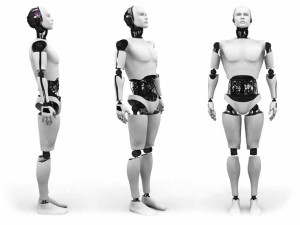Computers and Robots in our Brave New World
Imagine a world where most repetitive functions are performed by robots powered by computers.
Restaurants of the future would be serviced by iPads or other digital devices. Most health care visits would be via FaceTime or Skype or the latest remote video/audio access. Automobiles of the future will not need a driver and will automatically seek out the fastest route based on traffic of the moment.
Just as cars and cell phones have become ubiquitous, personal robots will be assisting us with activities of daily living. Some lines of work will be eliminated as has been the case every time a new technology is assimilated. However, new jobs with greater satisfaction, requiring new higher level skills, will be created.
Everything evolves. Once upon a time, transportation was primarily by foot or horse power. Along came bicycles, then automobiles. Farriers and blacksmiths were replaced by bike mechanics and auto mechanics who subsequently used their skills to build automobiles and the first airplanes. (The Wright Brothers started out as bike mechanics.) Even today’s cars and roads evolved from the horse-drawn carriage days. (The current width of many modern roadways is based on the width needed for two carriages to safely pass by each other.)
The growth of modern civilization and earth’s population soared simultaneously as the steam engine changed society forever. No longer was civilization dependent on muscle power from horses, oxen, or humans. The steam engine encouraged the growth of factories as power could appear anywhere. (Previously water, wind, or animals were needed to produce power to manufacture anything in volume.) With the steam engine, cities could grow, aggregating populations; simultaneously, farming became more efficient, requiring fewer farmers to grow enough food for the rest of society. Overall, productivity per person increased.
 Going forward, there will be a “new division of labor,” which is also the name of a book by Frank Levy and Richard Murnane. Their principle is that in any sensible economic system, people or machines would each focus on tasks and jobs where they have a competitive advantage. People are better at pattern recognition.
Going forward, there will be a “new division of labor,” which is also the name of a book by Frank Levy and Richard Murnane. Their principle is that in any sensible economic system, people or machines would each focus on tasks and jobs where they have a competitive advantage. People are better at pattern recognition.
Our brains are superb at taking in information via our senses and examining this information for patterns—but not as good describing how we are thinking. (Consider our intuition and how we can just feel something is right or wrong, but not be able to articulate our thoughts behind this feeling.)
Computers are good at following rules. If computers are asked to do arithmetic, computations of any sort, they are better, more accurate, and much faster than humans at complex calculations. In fact, many humans—myself included—have become dependent on the handheld calculator, which is part of my handheld device. In high school and college I took heavyduty physics classes, and I was able to do mental math with facility. Now I wouldn’t trust myself.
So consider a bank which is rating mortgage applicants by defining the ability of an applicant to pay back a loan. Objective data can be entered—earnings history, bank account balances, value of the real estate—which can translate into an accurate objective prediction.
Computers can do this task rather easily, freeing up a human for the more complex conversation requiring the interpretation and interaction with a potential customer to explain the objective process derived from the computer’s assessment.
Natural language software in your handheld device (for instance, Siri in iPhones) can direct you to a desired location, suggest a restaurant, or give you a score of an ongoing baseball game. Natural language processing software is still far from perfect but is getting better all the time. Many medical reports— including those from radiology, pathology, histories, physicals, consultations, and operative reports—are transcribed by a computer with proofing by either the dictator or another person
who might once have been a transcriber. Just as professions changed when transportation evolved, we are seeing the same evolution to more efficient and more satisfying work facilitated by technological change.
Language translation is soon to become part of Google’s capabilities. You speak English and out comes French. Smartphones can now handle about 15 different languages, which is beyond the ability of most humans.
My all-time favorite use of computers to help mankind is “Dr. Watson” who made his or her (I’m not sure of gender) debut on the TV show Jeopardy in 2011. IBM had a long and successful history of programing a computer to play chess or another complex game. A previous famous IBM computer, “Big Blue,” beat Russian chess champion Garry Kasparov. That paved the way for an even better, faster, smarter machine which starred on a game show but was ultimately developed to practice medicine.
“Dr. Watson” enrolled in medical school. Since February 2013, Watson has assisted in utilization management decisions in lung cancer treatment at Memorial Sloan–Kettering Cancer Center. Subsequently WellPoint, a large insurance company in Indiana, has been reviewing claims for the past few years with an eye towards encouraging evidenced based medicine. IBM Watson’s business chief Manoj Saxena says that nurses in the field who use Watson now follow its guidance 90 percent of the time. By the
way, Watson is multilingual and with FaceTime or Skype you can be diagnosed and treated in the comfort of your own home. If some physical findings need to be confirmed, a nurse practitioner or physician’s assistant can schedule a visit at your convenience in your home.
Computers and robots are not humans and are not nearly as versatile as we are. Hans Moravec, an expert on robotics and artificial intelligence, has observed, “It is comparatively easy to make computers exhibit adult-level performance on intelligence tests or playing checkers, and difficult or impossible to give them the skills of a one-year old when it comes to perception or mobility.”
This statement has been codified as “Moravec’s Paradox,” which essentially means that high-level cognitive skills like playing chess are easier for computers, but not low-level sensory and motor skills like playing with a ball. In case you’re worrying that robots and computers will replace humans – don’t!
But if we are all smart and willing to learn and evolve, we can live in a brave new world where robots are programmed to make our lives better, so we can all enjoy longer, happier, and healthier lives.


Leave a Reply
Want to join the discussion?Feel free to contribute!